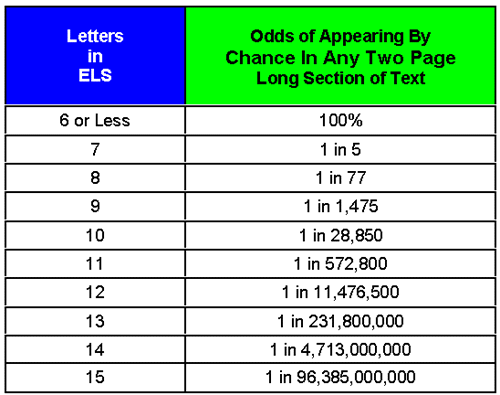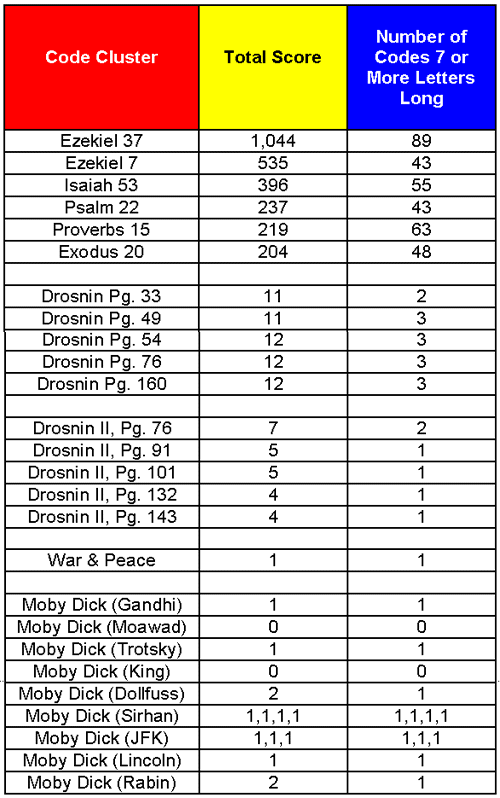| |
Comparing Apples and Oranges
In order to further remove the evaluation of Bible codes from the realm of the subjective, we have been working to come up with a rating system for code clusters that will enable us to compare apples with apples and oranges with oranges. And we think we have hit on a way to do it.
This system is based on the length of the ELSs in a cluster. How long a Bible code is makes all the difference in terms of how likely it is that it could just be due to chance.
If the code has six or fewer letters, it is virtually certain that you will find it somewhere in the Bible, or even any Hebrew book. But then, if the code has 15 or more letters, the odds of finding it in any randomly selected, two-page-long section of text in the Hebrew Bible are virtually zero. The following table shows how the odds of finding a given code drop precipitously as the code gets longer.

|
So all codes are not equal—not by a long shot. The longer a code is, the less likely it is to just be due to chance.
Some code skeptics would have people believe that all purported codes are equal. That is, they are all bogus. They are wrong.
Some of these skeptics think that all they had to do to discredit Bible codes was to come up with a cluster of codes from some book that no one would think of claiming was attributable to a super-human source. So they pulled together seven “codes” about Hanukah that they found in a portion of a Hebrew translation of Tolstoy’s War and Peace. What they didn’t bother to tell us is that all of the codes they found (the longest was seven letters) could be easily attributable to chance.
Since “codes” with less than seven letters are virtually certain to be found in any book, anything shorter than that should be thrown out when assessing whether a code cluster could be random.
Here is our simple, yet reasonably accurate, approach to comparing different code clusters in terms of their improbability. For each code with a skip of more than one letter, we subtract six from the number of letters it has, so that any code with six or fewer letters counts for zero points. We then add up all the points for all of the codes in the cluster. The more lengthy codes in a cluster, the higher the score. The higher the score, the more improbable the cluster.
So, how do the different clusters found to date (examples based on findings up to the end of March of this year) rate by this simple system? The next table provides the results. It also shows the rating of the Hanukah cluster from War and Peace, the five highest rated clusters from Michael Drosnin’s books (the original and Bible Code II), and the Moby Dick assassination codes (clusters rated 11 and above shown).

|
Clearly, the skeptics’ best example of a code cluster from a book other than the Bible is severely outclassed. The table also shows the dramatic improvement in Bible code research results in the five years since Drosnin’s book was published.
One reason the Ezekiel 37 cluster far outdistances others is that it and the Ezekiel 7 clusters have been the major focus of our research since September 11. It may be that other clusters will catch up once we have had the time to research them further.
|
Enjoy finding your own Bible codes.
Bible code search software is available in our online store.
Subscribe Free! Sign Up Today!
Become a member of the non-profit Isaac Newton Bible Code Research Society.
Not only will you be part of the world's leading organization researching and publicizing Bible and Torah codes, but you will receive Bible Code Digest absolutely free, including . . .
- Latest Bible Code News
- Easy-to-Understand Bible Code Feature Articles
- Exciting Inside Information from Leading Code Researchers
- Details of Great New Discoveries
- Summaries of the Latest Battles Between Code Proponents and Skeptics
Stay current on Bible code news. Be first to hear about all of the latest Bible code discoveries.
Sign up to receive Bible Code Digest today.
|
|







Click here
and sign up to receive Bible Code Digest with no cost or obligation.
 Code Skeptics' Arguments Trashed Ever since the first Bible codes were announced, skeptics have been saying, "Oh, well, you can also find codes like that in books like War and Peace and Moby Dick."
We took the time to examine this notion and the best example of it that the skeptics have been able to come up with. The results of our research have completely blown away their theory.
Click here to see for yourself.
NEW: Second Study Undermines
Skeptics' Main Objection
to Codes
Click here for report |











